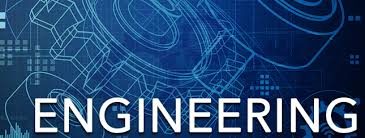Engineering is a broad STEM discipline that’s concerned with applying scientific theories and mathematical concepts to the design and formation of technical solutions. You might think of inventors as the people that come up with incredible ideas and engineers as the people that make those ideas a reality.
Humans have been undertaking engineering projects for millennia. From Ancient Greece and Rome to modern-day marvels, engineers have shaped (and reshaped) human civilization.
In this basic guide, you’ll learn more about the fundamentals of the field of engineering, including types of engineering degrees, expected pay for engineers, and, of course, why accredited online colleges for engineering are so important.
Engineering Degree Types
 One of the most interesting aspects of accredited online engineering degrees is that there are so many choices. While there are certainly similarities between various types of engineering degrees, they also have many differences and applications.
One of the most interesting aspects of accredited online engineering degrees is that there are so many choices. While there are certainly similarities between various types of engineering degrees, they also have many differences and applications.
Below is a list of just a few common types of online engineering degree programs you might consider for your higher education:
- Mechanical Engineering – From airplanes and automobiles to generators, mechanical engineering degrees build the skills to manufacture and test complex machinery.
- Electrical Engineering – As the field’s largest sub-specialty, electrical engineering degrees teach students to design wiring systems and circuits that transmit power.
- Civil Engineering – Degrees in civil engineering prepare engineers to develop construction projects for sound roads, buildings, dams, and other vital infrastructure.
- Computer Engineering – In today’s digital world, computer engineering degrees are important for producing engineers who design and develop high-tech hardware or software.
- Petroleum Engineering – Studying petroleum engineering equips graduates to design innovative strategies for extracting oil and gas from underground wells for energy.
- Biomedical Engineering – Biomedical engineering degree programs train students to design medical innovations that improve patient quality of life.
- Engineering Management – At the master’s level, engineering management degrees instill the leadership traits needed to plan and coordinate projects with technical personnel.
Prospective online students often wonder, “Whats the easiest engineering degree?” or “What is the easiest engineering degree to get?” These are loaded questions because engineering is an inherently complex subject. Engineering includes a lot of math and science courses, and the subjects of study can be difficult to understand, let alone master.
Your online courses might include topics like robotics, project management, and information technology. You’ll likely learn about sustainability, information systems, and applied science subjects as well. This is to say nothing of the large number of credit hours you have to take in engineering courses. You’ll have to complete internships for most bachelor’s programs and master’s programs in engineering as well.
This being the case, it’s best not to focus on the easiest engineering degree – they all present their difficulties. Instead, it’s better to worry about the type of engineer you should become.
You might also find an answer to “Which engineering degree is the easiest?” by considering how you take your courses. For some students, being on campus in a physical classroom is easier because they learn better in an in-person format. On the other hand, online learning in a school of engineering is easier for some people because of the flexibility it offers. So, it’s likely less about the easiest engineering major and more about finding the right major and the right modality for taking classes that will set you up for success.
See Also: Easiest Online College Programs for Undergrads and Top Easy Accredited Online Master’s Programs
Why is Accreditation Important for Engineering Programs?
If you’re interested in becoming an engineer, it’s crucial that you enroll in a program at a school accredited by the Accrediting Board for Engineering and Technology, or ABET.
ABET is a non-profit organization that accredits engineering programs at colleges and universities throughout the United States. ABET also accredits programs in the fields of computing, natural science, and engineering technology.
ABET accreditation is the gold standard for engineering programs. With ABET’s stamp of approval, engineering programs convey to students like you that the curriculum and coursework is of the highest quality. Graduating from an ABET-accredited program further instills confidence in your potential employers who know that your program of study meets stringent quality standards that have prepared you well for the engineering workforce.
Accreditation looks at many different factors, but ABET particularly focuses on what you learn and do as an engineering student in online accredited engineering degree programs and traditional on-campus programs. Programs that demonstrate a commitment to safety, precision, and a high level of commitment to technical quality are most likely to be accredited.
ABET’s accrediting criteria were developed by a large network of more than 2,200 industry experts. Their technical expertise and practical experience form the foundation of accreditation in this field. ABET accreditation is very highly respected and is sought after by engineering programs around the globe. This goes for traditional brick-and-mortar colleges as well as online colleges for engineering.
In addition to adding critical value to engineering programs, accreditation also ensures that students at accredited institutions receive a similarly high-quality education. Whether you graduate from a school on the east coast, west coast, or somewhere in between, your engineering education in an ABET-accredited program will be very similar in terms of rigor. There are no easy engineering majors accredited by ABET!
Another important aspect of graduating from an accredited engineering program is that many jobs in this field require that your degree be from an accredited institution. Without the ABET accreditation, you might not be able to get your foot in the door, let alone be hired for an engineering position.
If engineering is in your future, do your due diligence and make sure that the programs you’re considering have the appropriate accreditation. Fortunately, there are many engineering degree online accredited programs. You can search for specific institutions to see if they have ABET-accredited programs here.
See Also: Do the Cheapest Accredited Online Colleges Provide a Good Education? and How Does Accreditation Affect Financial Aid?
Income Information for Engineers
 According to PayScale, five of the 15 highest-paying bachelor’s degrees belong to the engineering field for strong income potential. This includes the top three on the list for the median mid-career yearly pay:
According to PayScale, five of the 15 highest-paying bachelor’s degrees belong to the engineering field for strong income potential. This includes the top three on the list for the median mid-career yearly pay:
- Petroleum Engineering – $187,300 median salary
- Operations Research and Industrial Engineering – $170,400 median salary
- Electrical Engineering and Computer Science – $159,300 median salary
Additionally, the Bureau of Labor Statistics (BLS) predicts that some of these areas will continue to see strong growth. For example, the BLS predicts that jobs in the petroleum engineering sector will grow at an eight percent rate through 2031. Industrial engineering should see job growth in the 10 percent range for the same period. Electrical engineering is expected to see lower-than-average growth at just three percent through 2031.
Engineering is a very diverse major, too with many different disciplines from which to choose, including those discussed earlier. There are plenty of other engineering career choices, too:
- Systems engineering
- Aerospace engineering
- Software engineering
- Environmental engineering
- Chemical engineering
- Nuclear engineering
Of course, each specialty in engineering comes with its particular advantages and disadvantages, as well as different income potentials.
However, whether you’re starting a bachelor’s or finishing a doctorate, the engineering field offers generally well-paying engineering jobs. As a prospective engineering student, you’ve taken a great first step toward your future by learning about accredited engineering programs. Now comes the hard part – researching programs that are of interest to you and determining which one is the best fit for your needs.
If you have a school in mind as a favorite, connect with the College of Engineering at that school to get detailed information about the program. You can learn things like:
- Whether an online bachelor of science is offered, like a bachelor of science in electrical engineering
- Details about a graduate program of study
- The eligibility requirements for admission if you’re a high school student and other enrollment details
- Whether you can study part-time or full-time
- The cost of in-state, out-of-state, and online tuition
Engineering programs will be happy to help you learn more about what it takes to become a professional engineer, too. This might include the methodology that companies use to hire engineers.
In other words, the professionals in university engineering departments can answer a lot of different questions to help you get on the right track, whether you plan to study at online schools like New York University, the University of Alabama, Arizona State University, or somewhere in between.

